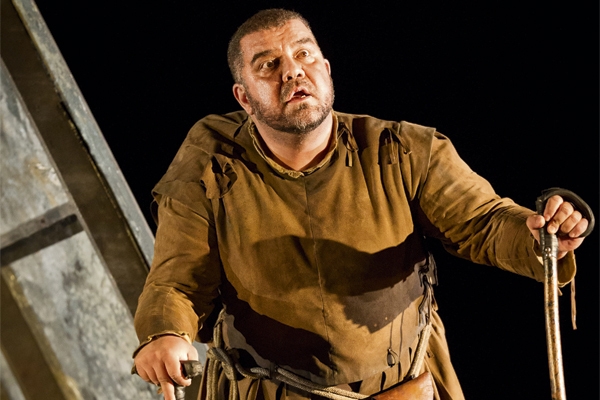Lightning struck, after what must surely be one of the most dreary seasons at the Royal Opera, with a revival of Rigoletto. You never know. I haven’t been an admirer of John Eliot Gardiner, either in the pre-classical repertoire in which he made his name, or in his excursions into more recent orchestral and operatic music, for instance Puccini’s Manon Lescaut at Glyndebourne.
With the opening bars of Rigoletto, however, it was immediately clear that his tight grip on proceedings was going to have thrilling results, even though the orchestra took a little time to settle. David McVicar’s production of decrepit Mantua is itself looking pretty decrepit by now, and the opening orgy sorely needed a generous hand-out of Viagra. But the musical side of things, and the dramatic intensity of the singers, soon put all that in the shade. This was the strongest cast the production has seen, even if a couple of the singers could give still finer accounts of their roles.
Vittorio Grigolo looks ideal for the Duke, and he has an attractive voice, but I constantly felt like telling him to cool it, vocally. He forced his tone, ignored the crucial Verdian legato, and veered close to parody. Ekaterina Siurina, who has sung Gilda in this production before, was perfect. A role that verges, at any rate for the first half, on insipidity, here had determination and drive, and faultless coloratura. Dimitri Platanias, in the title role, has a magnificent voice, and used it with sensitivity and passion, though the vindictive side of Rigoletto, which makes the courtiers’ loathing understandable, needs developing. There was superb in-depth casting in the roles of Sparafucile and Maddalena: Matthew Rose was, as always, an electrifying presence, and Christine Rice literally threw herself at the Duke, and didn’t miss. Meanwhile Gardiner was binding it all together, something few conductors of this centrifugal opera manage to do, and propelling it to a climax of almost unbearable tension and pathos. Go.
The Mariinsky Opera paid a flying visit to the Barbican, only managing to fit Parsifal and Verdi’s Requiem into 28 hours. The Verdi, for me his greatest work, with not a single bar that is less than inspired, suits Valery Gergiev and his forces to at T. A pity that in a work containing many pregnant pauses Gergiev feels impelled to exhale noisily through every one — this reduced the prelude to Parsifal to absurdity; surely someone close to him could ask him, or, in Russia, command him, to stop. He predictably followed the fairly recent trend, encouraged by recordings, of giving us an almost inaudible first few minutes, until the excellent tenor Sergey Semishkur launched into the Kyrie, and from then on things took off and remained airborne, in an unusually swift performance. At first I feared that soprano Viktoria Yashtrebova was going to sound as pallid as she looked, but she soon proved a match for Olga Borodina. In the marvellous Agnus Dei they made a seraphic pair; elsewhere Borodina revealed the Delila-Amneris side of her vocal personality to usual effect. And bass Ildar Abdrazakov took his place in the great line of Russian basses, muttering ‘Mors’ to more frightening effect than all the trumpets of the Day of Judgment, which are so exhilarating that one can hardly wait for that day to arrive.
The orchestra was stupendous, the chorus rather less so, partly because larger forces were needed to balance what was being thrown at them. At least the ladies never slid out of tune as they did disastrously in Act I of Parsifal. I have heard performances of the Requiem that have made me ponder more on what Boito, contemplating Verdi’s corpse, called the ‘mysterious, blind, stupid, triumphant infamous power’ of death, but really if that is what one wants to contemplate the Requiem is never the ideal place to do it — it is always too enjoyable.
Debussy famously said that the orchestra in Parsifal was lit up from within, an image which perfectly catches its unique sonic splendours, along with the composer’s own comment that he wanted it to give the impression of clouds merging and separating. What Gergiev gave us was a search-beam directed on to the work, so that it was brilliantly lit from without. Take the first trumpet solo in the Prelude. It is marked pianissimo and ‘very tenderly’, rising for one note to sforzato and then sinking back. Gergiev’s trumpet positively blazed forth. This was Parsifal redone by Tchaikovsky.
Some of the singing was good, some disabled by appalling German. The Amfortas of Evgeny Nikitin stood out for his passionate but always musical portrayal of that character’s agonies, and Yury Vorobiev’s Gurnemanz, though too youthful, made sumptuous sounds and hieratic gestures. I’m not sure that the Mariinsky orchestra could ever produce the right sounds for Parsifal, but if they did it wouldn’t be under Gergiev.






Comments